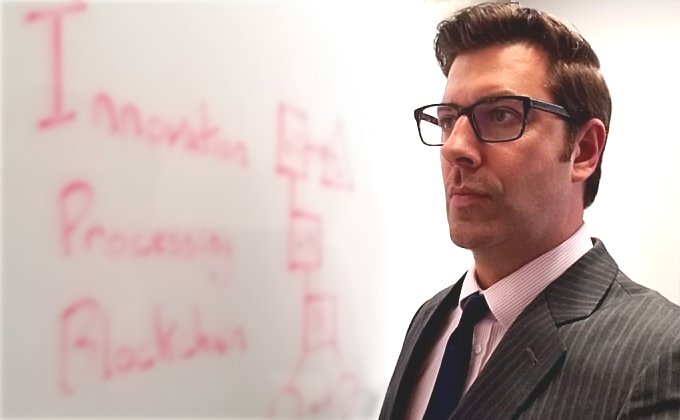Joseph Raczynski isn’t scared of making bold predictions.

For example, he predicts it will be illegal for humans to drive cars by 2035. He also thinks most banks will be gone within the next decade.
Though some may argue with those bold guesses, Joe has more than 170,000 followers on Twitter who find his thoughts and ideas valuable.
"Since I was a kid, I have always been tinkering, breaking and rebuilding things. It’s a knack I have been blessed with, but drives me to figure out how to make something better."
Joe is still passionate about all things "future-related," with a special focus on law and legal technology. Today's 20 questions interview taps into some of his knowledge, including Joe's thoughts on the future of cryptocurrencies.
But, perhaps best of all, Joe is seriously considering becoming a Steemit blogger.
20 questions with Joseph Raczynski
1 - How would you describe yourself in one sentence?
Joe - I am passionate about technology, trends and exploring everything around us because it’s so exciting and ever changing.
2 - For those who aren't familiar with it, what is your website, "Joe Technologist," all about?
Joe - JoeTechnologist.com is a collection of all the tech stuff that I have been involved with for the last bunch of years. There are blogs/videos/speaking engagements listed which describe things that made it and those that didn’t e.g. Google Glass.
3 - I understand you're an early adopter of all things computer-related. Have you been this way your whole life, or was there a specific moment or event that piqued your fascination with technology?
Joe - Since I was a kid, I have always been tinkering, breaking and rebuilding things. It’s a knack I have been blessed with, but drives me to figure out how to make something better. The moment of time that changed my life in this light was watching the movie War Games. After that I was hooked on computers and early networks and phone hacking or phreaking.
4 - What are some of the most significant changes you see coming down the road in law and legal technology?
Joe - Though many in the industry don’t want to admit it, law firms will be changing dramatically over the coming years. Much of what an attorney does now can be automated – or soon be. Contract attorneys draft documents. More often than not, most of the language they use comes from another previously created document. That should be automated. Workflow solutions are being made, which even enable non-lawyers to draft legal documents with dropdown menus based on conditions. On the Litigation side, most of the expense right now is having attorneys read through thousands or millions of pages of discovery. Machine review has taken hold and will continue to have an impact in this space. In the future, we will see more “code becoming law” meaning a program says if this, then that and we would have to abide by that – likely making things a bit more absolute with less discretion. Yes, I for one will welcome our computer overlords. ;)
5 - Are there any risks with adopting emerging technologies in a field as important as law?
Joe - Law always follows the trends, at about 20 steps behind it. With so many things happening around us now with technology, the law will need to double time it to catch up. The legal industry tends to be conservative and cautious, so that mentality will have to change, or we will see a larger gap between what is meant to protect people and our new reality.
6 - What is DC WiFi all about and why did you feel it was an important project to take on?
Joe - DC-WiFi was a project I started to create a mesh network of open WiFi networks across DC and other cities. You were able to wander the streets, laptop in hand and have Internet all over town without coughing up big bucks. At least that was the goal. Now that WiFi is nearly ubiquitous, the project stands as a memorial to the pangs of broadband from not long ago.

7 - You've made a number of bold predictions on your website. You've guessed that it will be illegal for humans to drive vehicles by 2035. Why do you believe that will be the case?
Joe - Funny, yes the predictions were written many years ago. Illegal for humans to drive by 2035 is an interesting one. The concept is that soon the government/insurance industry will play an even larger role with regulation of autonomous vehicles. Soon we will all be riding in these contraptions. They will communicate with each other, nearly eliminating traffic, accidental death, and will have incredible energy efficiency. That’s all good. However our perspectives will change and placing a human behind the wheel at that point will almost seem idiotic or dangerous akin to having kids working in factories, smoking cigarettes and bleeding people to drive out the evil spirits. Those of us who enjoy driving will be relegated to tracks off public roads.
8 - You have to make one new prediction for something you think will happen within the next 10 years. What is it?
Joe - Most of the banks we see today will be gone and people will transact directly with each other as the tokenization of every asset (real estate, art, cars, etc) will eliminate the need for their traditional role.
9 - How long have you been interested in cryptocurrencies?
Joe - I dove into Bitcoin in 2011 – though I lost everything with the Mt. Gox debacle. It was a learning experience but am passionate about this space and its potential to change the world in the coming years. It’s going to be awesome in so many ways.
10 - 2017 has been a wild ride for Bitcoin and other cryptocurrencies. What do you see happening the rest of this year, and into 2018?
Joe - It could get even more bumpy. Likely we will see the SEC or other government agencies come out with more guidance, or go after a newer company to make an example of them. There is probably some need for very minor regulation in this space, but as the money tossed into this space gets bigger, you are going to see the traditional models get more and more concerned that they are no longer a part and then exert their old school powers to try to reign it in. That said, I think that the cat is out of the bag on this blockchain decentralized model. I really think it is hard for any central authority to control it. This can become a very egalitarian movement which allows for the poorest to join in on things like never before. So we will see generally an upward trend of the altcoins with a jagged, seesaw movement. Hang on!
11 - One of your bold predictions is that Bitcoin (or a like cryptocurrency) will be the world currency by 2025. Are you standing by that prediction?
Joe - I made that prediction in 2014. Yes, for better or worse the cryptocurrencies will take over the world. I think it’s a better model, but to think that major currencies like the Euro/Dollar/Yen/Yuan could be completely deleveraged sounds frightening to my economics/sociology undergrad self. More ludicrous would have been trying to convince me of this when going through my MBA program. In the big picture, it should make countries that are less stable – more secure for those simply trying to hold on to what they rightfully own.
12 - Is Steem a cryptocurrency you're familiar with? If so, what are your thoughts on it?
Joe - Yes! It is a great site and I find myself reading blogs on it almost every night.
13 - Would you ever consider blogging on Steemit?
Joe - I have a few sites that I write on, but I created an account on Steemit recently, which I think I will give a go soon.
14 - Other than Bitcoin, what cryptocurrencies do you predict will have a promising future?
Joe - To the moon with Ether. It is my favorite currently. I am also a fan of Civic (CVC) because they are tackling the identity issue surrounding so many things including hacks. I had an opportunity to listen to and speak with Vinny Lingham (Civic CEO) at Consensus in NYC recently. His vision on how to control one’s identity on chain verses off chain is on point. The example he gave is very helpful to understanding this problem: when you walk into a bar and you have to prove your age. So what do you do? You give a bouncer your driver’s license, which has on it: your picture, date of birth, full address, and likely a unique state given identifier. What does the bar really need to know – just that you are 21 or older. Instead you gave away the house, all of your information. With CVC you can offer a QR code that proves you are 21 or older and provides nothing else. It is very neat tech that is already built out. For transparency, I do own some CVC.
I also like EOS, Monero, Tezos, and REP or Augur.
15 - Who inspires you?
Joe - Genuinely good authentic people.
16 - What is your greatest fear?
Joe - A freezer without ice cream.
17 - What is your biggest pet peeve?
Joe - Dishes left in the kitchen sink.
18 - You get to have dinner with three people, living or dead. Who are you eating with?
Joe - Rasputin, Marilyn Monroe, Sophocles
19 - What do you see yourself doing 10 years from now?
Joe - AI will have taken over most jobs – so hopefully I will be speaking on the next 10 years of change – or my AI self will be doing that for me.
20 - What is one thing very few people know about you?
Joe - If I start something, i.e. a project, I do not take a break until it is completed. Project done! ;)
Thanks to Joe for sharing some of his predictions and knowledge in this edition of 20 questions. (I personally can’t wait until he is a regular Steemit blogger!)
As always, thanks to all of you for taking the time to read.
Who would you like to see me throw 20 questions at? Drop me a comment below and I'll work on setting up the interview.
If you like what you read, be sure to follow my blog!

Previous "20 questions" interviews:
20 questions with @heiditravels
20 questions with @katecloud
20 questions with @manthostsakirid
20 questions with @blockchaingirl
20 questions with @piedpiper
20 questions with @stellabelle
20 questions with @budgetbucketlist
20 questions with @rogerkver
20 questions with @allasyummyfood
20 questions with @the-alien
20 questions with Janina Storace
20 questions with @mrs.steemit
20 questions with @andrarchy
20 questions with Scott Young
20 questions with Jesse Heiman
20 questions with @dragosroua
20 questions with Chelsea Dinsmore
20 questions with @sirwinchester
20 questions with Ludvig Sunström
20 questions with Kyle Eschenroeder
20 questions with @roelandp
20 questions with Tim Brownson
20 questions with Sean Ogle
20 questions with Henri Junttila
20 questions with Hal Johnson
20 questions with Farnoosh Brock
20 questions with Manny Kess
20 questions with John Goehrke
20 questions with Sunny Lenarduzzi
20 questions with The Cranky Flier - Brett Snyder
20 questions with Shawn Murphy
20 questions with Leo Babauta
20 questions with Jacob Staudenmaier
20 questions with Steve Scott
20 questions with Stefan Hyttfors
20 questions with Zachery Ty Bryan
20 questions with Ryan Lancaster
20 questions with Richard Millington
20 questions with E-mail Prankster

